Qureshi urges flexibility in Afghan process
FM calls on Heart of Asia members to focus on expediting efforts for political settlement in war-torn country
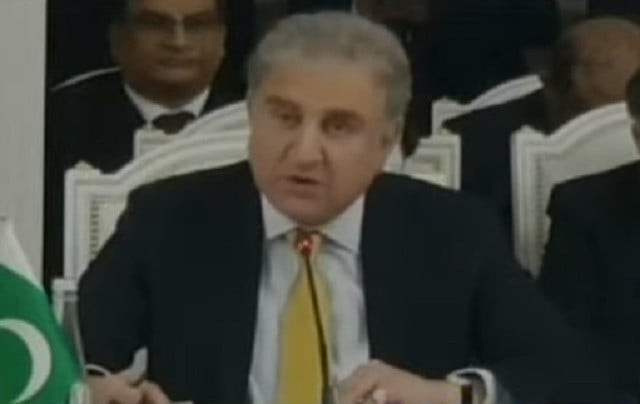
The Afghan peace process stands at a defining juncture, Foreign Minister Shah Mahmood Qureshi said on Tuesday, calling for constructive engagement and consultations on all key aspects of the peace process and flexibility by the Afghan sides in the spirit of compromise.
Addressing the Heart of Asia-Istanbul Process meeting of foreign ministers in Tajikistan’s capital Dushanbe, Qureshi expressed concern over continuous violence in the country, warning that any space gained by Al-Qaeda or Da’esh militants there could “accentuate the threat of terrorism”.
The conference, aimed at pushing for expediting the peace drive, is attended by foreign ministers and representatives of Turkey, Russia, China, Pakistan, Saudi Arabia, India, Iran, Azerbaijan, Kazakhstan, Kyrgyzstan, Turkmenistan, the United Arab Emirates, and Uzbekistan.
The meeting comes ahead of another key international conference on Afghan peace in Turkey. During the conference, Afghanistan’s immediate neighbours and key global players in the peace process called for expediting efforts for a political settlement in the war-ravaged country.
In his address, Qureshi warned against “internal and external spoilers” in the Afghan peace drive. “Our message to the Afghan leadership is to continue and make this process successful through a sincere, concrete and meaningful dialogue as there is no military solution to this issue,” he said.
The Heart of Asia-Istanbul Process is an important platform, bringing participating and supporting countries together to advance the goals of peace, stability and prosperity in Afghanistan. The gathering followed the US-Taliban Peace Agreement signed in February last year.
Also read Pakistan, India FMs to come face to face after two years
Qureshi stressed that the progress made in the Doha process has created a historic opportunity for the Afghan leadership to achieve a negotiated political settlement. “Our message to all of them is to take the process forward through good faith, substantive and result-oriented negotiations,” he said.
“We are cognisant that this historic opportunity for the Afghan nation is also laced with formidable challenges,” he said, but added: “Constructive engagement and consultations on all key aspects of the peace process are imperative. Flexibility and a spirit of compromise would be indispensable.”
The foreign minister suggested to the conference to focus on eight key areas: consolidating on gains of the Doha process; preserving international community’s investment; ensuring orderly withdrawal; early ceasefire; culminating peace process into a sustainable political solution; securing financial engagement in post-conflict progress; long-term reconstruction; and, return of Afghan refugees.
Qureshi told the conference that besides facilitating the peace process, Pakistan was extending all possible support to Afghanistan. “Pakistan will continue to support a peaceful, stable, united, democratic, sovereign and prosperous Afghanistan, at peace with itself and with its neighbours.”
Earlier, addressing the meeting, Afghan President Ashraf Ghani reiterated the resolve to achieve lasting peace and accomplish mega regional projects of energy transfer and connectivity. “Ensuring peace and security in Afghanistan is important for all of us like oxygen,” he said.
Ghani outlined his plans for peace, saying that he would step aside if an election was held in his country. “I ... strongly support holding elections at the earliest possible time,” Ghani. “My greatest honour will be to hand over authority to my elected successor.”
Speaking at the occasion, Tajikistan President Emomali Rahmon stressed the Afghan conflict has no military solution. He welcomed efforts by the government of Afghanistan for peace and expressed Dushanbe’s support for a ceasefire and political settlement.
Bilateral meetings
Ghani also held separate meetings with Foreign Minister Qureshi and Indian External Affairs Minister Subrahmanyam Jaishankar. The Afghan Presidency said Qureshi expressed support for the calls of ceasefire and a democratic Afghanistan.
The Foreign Office said in Islamabad that Qureshi and Ghani discussed matters of bilateral interest including Afghan peace process. Qureshi expressed Pakistan’s desire for a peaceful and stable Afghanistan, and stressed that peace in Afghanistan vital for sustainable stability in the region.
The foreign minister stressed that positive developments as a result of intra-Afghan talks could help bring Afghan peace process to a logical conclusion. Later, Qureshi also held a separate meeting with Afghan Foreign Minister Haneef Atmar to discuss bilateral relations and the peace process.
Qureshi also met with Iran’s Foreign Minister Dr Javad Zarif, on the sidelines of the 9th Ministerial Conference of the Heart of Asia–Istanbul Process, the Foreign Office said in a separate statement. They exchanged views on regional issues, particularly the Afghan peace process, it added.
During the meeting, the two foreign ministers also reviewed progress on the opening of new border crossing point. They agreed on the need for expeditiously finalising arrangement for facilitating legal trade to improve livelihood in the region.
Foreign Minister Qureshi thanked Iran for its steadfast support to Pakistan on the Jammu and Kashmir dispute and Prime Minister Imran Khan’s efforts to counter Islamophobia and promote inter-faith harmony.
Later, in a meeting with Kazakhstan’s Deputy Prime Minister and Foreign Minister Mukhtar Tileuberdi, Qureshi noted that there was immense potential to further strengthen bilateral cooperation in diverse fields, including trade, aviation, railways and connectivity.
They agreed to optimally utilise the bilateral institutional mechanisms to promote practical cooperation, particularly through the Inter-Governmental Commission (IGC), bilateral political consultations (BPC), and joint working groups (JWG) in relevant fields.
Highlighting that Pakistan provided the shortest route to Central Asian States through the Gwadar port, Qureshi invited Kazakhstan to utilise the opportunity for mutual benefit. He also emphasised the importance of reinforcing road connectivity through a quadrilateral traffic in transit agreement.
Agencies

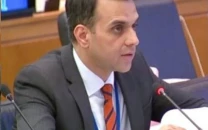
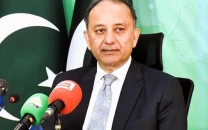
1724926799-0/Untitled-design-(7)1724926799-0-208x130.webp)
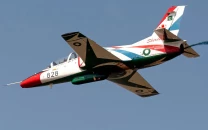

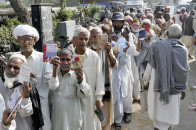












COMMENTS
Comments are moderated and generally will be posted if they are on-topic and not abusive.
For more information, please see our Comments FAQ